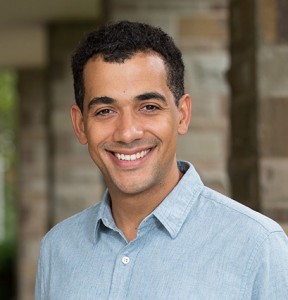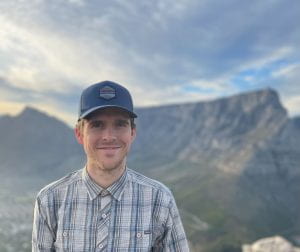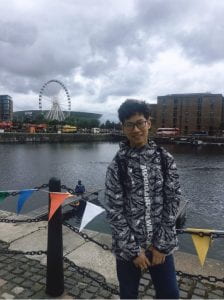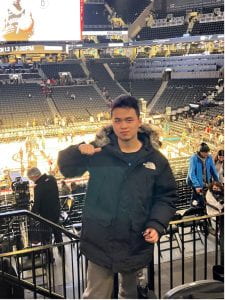Group Members

Matthew Reid is an assistant professor in the School of Civil and Environmental Engineering at Cornell University. His research program focuses on applications of biogeochemistry and ecosystem engineering to water quality problems. Research in the Reid Lab synthesizes molecular- and mechanism-level investigationn to describe contaminant dynamics in complex biogeochemical systems, and seeks to integrate quantitative descriptions of biogeochemical processes in the development of a sustainable green water infrastructure.
Dr. Reid’s research has been recognized with an NSF CAREER Award, and he has twice received Excellence in Teaching awards from the College of Engineering at Cornell University. Dr. Reid was a postdoctoral scientist in the Environmental Microbiology Laboratory at the Swiss Federal Institute of Technology, Lausanne (EPFL), where he was supported by a Marie Sklodowska-Curie fellowship. Dr. Reid completed his Ph.D. in Civil and Environmental Engineering at Princeton University in 2014 and received his bachelors degree in chemistry from the University of Chicago. Dr. Reid has also worked as a high school chemistry teacher with the United States Peace Corps in Tanzania. CV.
Postdocs
Michael Vega (he/him) is a microbial biogeochemist interested in how microbial communities can be harnessed to solve environmental sustainability problems. He completed B.S. degrees in Geology and Chemistry from Kansas State University, where he was involved in research investigating arsenic mobilization in the groundwater of West Bengal, India. For graduate school , he obtained an M.S. in Hydrologic Science and Engineering and a Ph.D. in Civil and Environmental Engineering, both from the Colorado School of Mines. His dissertation focused on microbial community contributions to contaminant removal and greenhouse gas emissions in nature-based water treatment systems. As an Atkinson Postdoctoral Fellow at Cornell, his work focuses on rice farming sustainability – specifically how microbial nitrogen and arsenic cycling metabolisms are interconnected in rice paddy soils subjected to alternate wetting and drying, and how this regulates greenhouse gas emissions and arsenic uptake in rice. Outside of research, Michael enjoys backpacking, homebrewing, birding, and relaxing with family, friends, and his two cats.
, he obtained an M.S. in Hydrologic Science and Engineering and a Ph.D. in Civil and Environmental Engineering, both from the Colorado School of Mines. His dissertation focused on microbial community contributions to contaminant removal and greenhouse gas emissions in nature-based water treatment systems. As an Atkinson Postdoctoral Fellow at Cornell, his work focuses on rice farming sustainability – specifically how microbial nitrogen and arsenic cycling metabolisms are interconnected in rice paddy soils subjected to alternate wetting and drying, and how this regulates greenhouse gas emissions and arsenic uptake in rice. Outside of research, Michael enjoys backpacking, homebrewing, birding, and relaxing with family, friends, and his two cats.
Graduate Students
 Hyun Yoon, originally from Seoul, South Korea, completed his Bachelor’s Degree in Atmospheric Science at Yonsei University. It was during this time that he developed a keen interest in the mitigation of greenhouse gas emissions. Subsequently, he pursued his Master’s Degree in Civil and Environmental Engineering at the Korea Advanced Institute of Science and Technology (KAIST). While at KAIST, his studies revolved around biofilters and their role in reducing nitrous oxide gas emissions in wastewater treatment plants.
Hyun Yoon, originally from Seoul, South Korea, completed his Bachelor’s Degree in Atmospheric Science at Yonsei University. It was during this time that he developed a keen interest in the mitigation of greenhouse gas emissions. Subsequently, he pursued his Master’s Degree in Civil and Environmental Engineering at the Korea Advanced Institute of Science and Technology (KAIST). While at KAIST, his studies revolved around biofilters and their role in reducing nitrous oxide gas emissions in wastewater treatment plants.
Currently, Hyun is actively involved in research that delves into the effects of dissolved organic matter on arsenic biotransformation in aquatic environments. To carry out his investigations, he utilizes microbes such as E. coli biosensors, alongside employing various analytical chemistry techniques like ICP-MS. When not occupied with his research, Hyun takes pleasure in watching Major League Baseball, savoring tasty snacks along the way. Additionally, he enjoys engaging in physical activities such as swimming and ice-skating.
 Lizeth Silva is a Ph.D. student in the Environmental processes area at Cornell University. Lizeth obtained her B.S. in Chemistry in 2022 at Universidad Nacional de Colombia. In Colombia, she worked in different soil and water laboratories where she did research on topics such as the use of different biochars from agricultural waste to adsorb cadmium from water, and developing methodologies to use golden-berry waste as a source of antioxidant substances. At Cornell, She began investigating the effects of iron minerals in the roots to obtain a better understanding of PFAS adsorption/transformation in wetlands. During her spare time, she loves , playing board games, swimming, making jewelry, and traveling around the world.
Lizeth Silva is a Ph.D. student in the Environmental processes area at Cornell University. Lizeth obtained her B.S. in Chemistry in 2022 at Universidad Nacional de Colombia. In Colombia, she worked in different soil and water laboratories where she did research on topics such as the use of different biochars from agricultural waste to adsorb cadmium from water, and developing methodologies to use golden-berry waste as a source of antioxidant substances. At Cornell, She began investigating the effects of iron minerals in the roots to obtain a better understanding of PFAS adsorption/transformation in wetlands. During her spare time, she loves , playing board games, swimming, making jewelry, and traveling around the world.
 Yi Sang grew up in China, and he completed his Bachelor’s degree in Earth and Environmental Sciences at University of Waterloo, Canada. Then he went to Cornell University and entered Dr. Reid’s lab to study the iron-modified biochar and its application in Arsenic contaminated paddy soil and multiple heavy metals rich sewage sludge contaminated soil. He was transferred to Ph.D. degree after the first two years’ study at Cornell. His currently research including: (1) Study the geochemical and hydrological processes the solubility of Manganese in a polymictic drinking water reservoir. (2) Study the mechanisms how iron and manganese redox activities could accelerate the mobilization of liable carbon from woodchips and thus increase the nitrate removal rate. He enjoys the life in Ithaca, and he likes BBQ, climbing, kayaking and skiing. He also had a yorkie and miniature schnauzer as well as a golden British shorthair.
Yi Sang grew up in China, and he completed his Bachelor’s degree in Earth and Environmental Sciences at University of Waterloo, Canada. Then he went to Cornell University and entered Dr. Reid’s lab to study the iron-modified biochar and its application in Arsenic contaminated paddy soil and multiple heavy metals rich sewage sludge contaminated soil. He was transferred to Ph.D. degree after the first two years’ study at Cornell. His currently research including: (1) Study the geochemical and hydrological processes the solubility of Manganese in a polymictic drinking water reservoir. (2) Study the mechanisms how iron and manganese redox activities could accelerate the mobilization of liable carbon from woodchips and thus increase the nitrate removal rate. He enjoys the life in Ithaca, and he likes BBQ, climbing, kayaking and skiing. He also had a yorkie and miniature schnauzer as well as a golden British shorthair.
 Zihao grew up in China and he completed his Bachelor’s degree in Environmental Science at Hohai University. During his undergraduate studies, he participated in several projects aiming at developing advanced wastewater treatment technologies. He has been a graduate student in Professor Reid’s lab at Cornell since 2021. His current project is to retrofit a field-scale woodchip bioreactor with sensors and actuators to improve its performance in mitigating nitrate releases in agricultural drainage. He is utilizing real-time control techniques of bioreactor conditions to boost denitrification rates. Zihao enjoys playing soccer and badminton in his spare time, and he also likes watching movies during the long winter in Ithaca!
Zihao grew up in China and he completed his Bachelor’s degree in Environmental Science at Hohai University. During his undergraduate studies, he participated in several projects aiming at developing advanced wastewater treatment technologies. He has been a graduate student in Professor Reid’s lab at Cornell since 2021. His current project is to retrofit a field-scale woodchip bioreactor with sensors and actuators to improve its performance in mitigating nitrate releases in agricultural drainage. He is utilizing real-time control techniques of bioreactor conditions to boost denitrification rates. Zihao enjoys playing soccer and badminton in his spare time, and he also likes watching movies during the long winter in Ithaca!
 River Himmer (they/them) is a graduate student in Earth and Atmospheric Sciences at Cornell University studying geochemistry. Graduating Summa Cum Laude from the University of Florida, their work examines volatile inclusions as geochemical tracers of plumbing systems at both interplate and intrplate settings. Now, their work focuses on volcanic activity in their tribal homelands in Yellowstone National Park, where they were awarded a residency in the summer of 2023. Their work is interdisciplinary and has included groundwater and aquifer pollution, deep sea current modeling, and paleoclimate work.
River Himmer (they/them) is a graduate student in Earth and Atmospheric Sciences at Cornell University studying geochemistry. Graduating Summa Cum Laude from the University of Florida, their work examines volatile inclusions as geochemical tracers of plumbing systems at both interplate and intrplate settings. Now, their work focuses on volcanic activity in their tribal homelands in Yellowstone National Park, where they were awarded a residency in the summer of 2023. Their work is interdisciplinary and has included groundwater and aquifer pollution, deep sea current modeling, and paleoclimate work.
“Their work ties traditional arts to land recovery, tribal sovereignty, and reclamation of of treaty rights. River is a well renowned Two Spirit Powwow Dancer and has made incredible strides in Native Human Rights efforts as well as Cultural preservation within their community and the broader indigenous community.” – Indigenous Justice Coalition.
 Yizhuo Zhang grew up in China, where he completed a Bachelor’s degree in Water Science and Engineering in 2022 at Chongqing University. While he was an undergraduate, he participated in several research projects focusing on sustainable wastewater treatment processes. His current research interests include geochemistry in wetland soils. He began researching the production of reactive oxidation species and organic matter transformation in wetlands rhizosphere starting from 2022 in the Reid lab. In his spare time, he enjoys playing video games, and going to Lynah Rink to support Cornell’s ice hockey team.
Yizhuo Zhang grew up in China, where he completed a Bachelor’s degree in Water Science and Engineering in 2022 at Chongqing University. While he was an undergraduate, he participated in several research projects focusing on sustainable wastewater treatment processes. His current research interests include geochemistry in wetland soils. He began researching the production of reactive oxidation species and organic matter transformation in wetlands rhizosphere starting from 2022 in the Reid lab. In his spare time, he enjoys playing video games, and going to Lynah Rink to support Cornell’s ice hockey team.
Former Group Members
Dr. Scott Maguffin (postdoctoral scientist 2016 – 2019) is now an assistant professor at SUNY-Oneonta
Dr. Lena Abu-Ali (PhD 2022) is now a physical scientist in the EPA Office of Water.
Dr. Philip McGuire (PhD 2021) is now a research scientist at Superbrewed Foods.
Simiao Wang (M.S. 2019) is now a PhD student in the Environmental Microbiology Laboratory at EPFL.
Xuhui Zhang (M.S. 2020) is now a PhD student in Civil and Environmental Engineering at the University of Illinois – Urbana Champaign.
Jenna Israel (B.S. in Environmental Engineering, 2021) is now a PhD student in Civil and Environmental Engineering at the University of California – Berkeley.
Natalie Butkevich (B.S. in Biology, 2020) is now a PhD student in Marine Science at Stony Brook University.
Olivia Pietz (B.S. in Chemistry and Chemical Biology, 2022) is now a PhD student at Harvard University.
Recent Comments